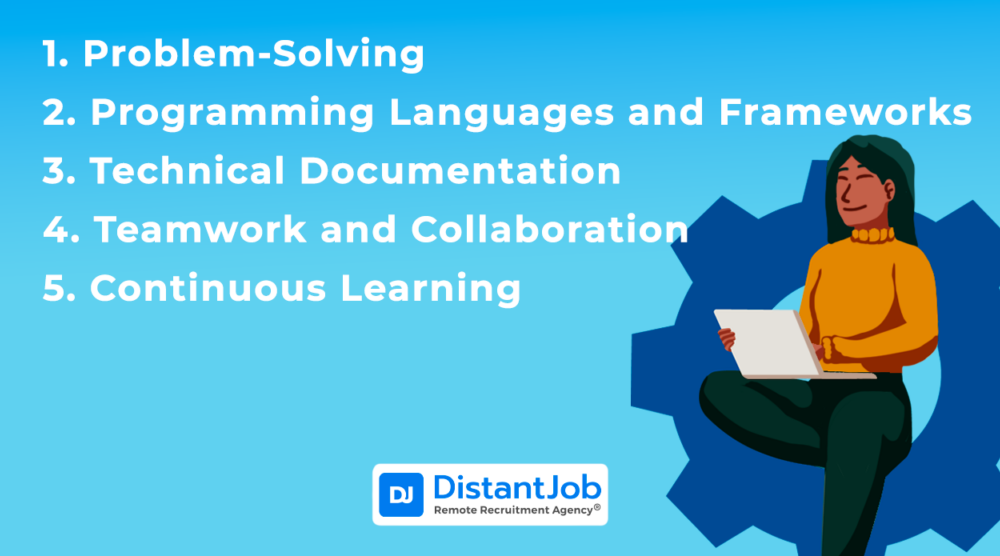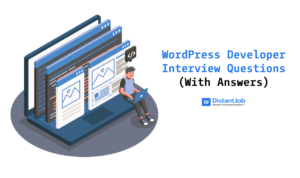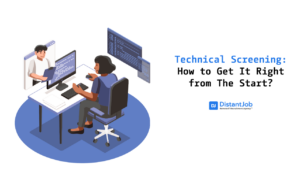As a professional in the tech industry, navigating the complexities of developer assessment is a critical aspect of your role. Whether you’re a team leader, HR professional, or hiring manager, understanding how to effectively evaluate the skills and potential of software developers is key to building a strong and productive team. Developer assessment is not just about gauging technical expertise; it’s a multi-faceted process that includes analyzing problem-solving abilities, coding skills, and team compatibility.
In this article, you’ll learn about the skills every developer should have and what are the best practical developer assessment strategies you can implement right away.
Let’s explore more on how to effectively conduct a developer skill assessment but first let’s see what skills should you asses.
Skills Every Top Developer Should Have

When assessing a developer during the interview process, have a watch out for these skills that combine both technical and soft skills.
Technical Skill Assessment
Can they actually do the job? Do they have the right technical skills? Here are the important ones to look for:
Strong Coding Abilities aka Programming Knowledge
Skilled developers should possess strong coding abilities, demonstrated through practical tests, even if in pseudocode, to reveal their understanding of various programming languages and frameworks.
Technical Documentation
Coders need to be able to create and maintain technical documentation, such as code comments, README files, and API documentation. They also need to be able to write clear, concise, and understandable technical documents that other developers can easily understand.
Thoughtful Design Decision-Making
A developer’s skill set is not confined to just writing efficient code; they must also be adept in making thoughtful design decisions and understanding the trade-offs and assumptions behind their choices.
Problem-Solving
Software developers need to be able to analyze problems and come up with solutions that are efficient, effective, and scalable. They must break down complex issues into smaller parts for easier management. Creative and innovative solution-finding is key.
Soft Skills
Beyond technical skills, a developer’s interpersonal and teamwork skills are equally critical.
Teamwork and Collaboration
They should be capable of collaborating effectively, managing conflicts, and pushing back against unrealistic demands – all while maintaining professionalism. Assertiveness, coupled with the ability to defend one’s professional opinion tactfully, is a valued trait.
Continuous Learning
Lastly, a developer’s motivation and engagement are key indicators of their potential for long-term success. A genuine interest in staying abreast of industry trends, continually enhancing their skills, and a commitment to professional growth are what differentiate a competent developer from the rest.
How to Assess Developers Effectively: 5 Simple Methods
Now you know what skills and qualities you are looking for in a developer. But how do you assess if a developer has these skills?
Here are 5 key strategies that will help you evaluate a candidate’s skills and technical abilities:
1. Do a Comprehensive Portfolio Review
Start by reviewing their portfolio.
Every developer, from junior to senior professionals, should maintain an up-to-date portfolio. A well-curated portfolio offers a window into a candidate’s career path, showcasing their professional experiences and coding prowess through various projects.
While reviewing portfolios, it’s crucial to keep the specific requirements of the role in mind. For instance, a candidate might have an extensive portfolio in web development, but if the role demands an iOS developer, their suitability may be questionable. Focus on projects that mirror the complexity, scope, and technology relevant to the position you’re filling. Assess the diversity of technologies they’ve handled, the user base size their projects catered to, and the nature of problems they’ve tackled.
Red Flags in a Developer’s Portfolio
Doing a comprehensive portfolio review also means being aware of potential red flags. Here are three of the most common ones to keep an eye for:
- Lack of Diversity in Projects: A portfolio lacking diversity in technologies or project types may indicate a narrow skill set.
- Incomplete Projects: Numerous unfinished projects could signify a lack of follow-through or ability to meet deadlines.
- Absence of Recent Work: If their portfolio doesn’t contain recent work, it might indicate their skills are outdated or a lack of continued interest in professional growth. However, it’s always good to ask them more about the reasons why they stopped working.
2. Evaluation of Their Coding Skills
Once you’re done with the portfolio review, it’s time to evaluate their technical skills.
You or an experienced programmer from your team have to evaluate their skills. This can be done through a practical coding test where the candidate writes code (real or pseudocode).
You can build a technical skill assessment test with platforms like HackerRank or Codility.
This can be done by signing up for a HackerRank for Work account and creating a custom coding test based on the skills required for your project, either by selecting questions from HackerRank’s library or creating your own.
Invite candidates to take the test before a set deadline. Once completed, review the scores and performance metrics provided by HackerRank to evaluate code quality, accuracy, and efficiency.
Ask specific questions about their code. Focus on understanding their design choices, why they made certain trade-offs, and their thought process behind alternative designs.
3. Assess Communication and Collaboration Skills
Hiring developers is not only about their tech skills but also their communication and collaboration skills. Do they express their ideas clearly? Are they able to explain complex terms to non-technical people? Can they work in a team or with your customers?
Assessing these skills can be challenging because, during the first interviews, their goal is to convince you that they are exactly what you need. So, for a communication or a collaboration assessment, you can consider two different approaches:
- Behavioral interviews
- References
Behavioral interviews are designed to assess how candidates have responded to different situations in the past, providing insight into their interpersonal skills and problem-solving approaches.
Questions should be crafted to elicit responses that demonstrate a candidate’s ability to communicate effectively, collaborate with others, and handle disagreements and whether they can constructively push back against unreasonable demands. You don’t want to end up with a developer who says “Yes” to everything that agreed to unrealistic deadlines, which often leads to failure or severe burnout.
From an external point of view, references are ideal. Speaking with previous employers or colleagues can provide invaluable insights into a candidate’s collaborative skills and contributions to team projects. It’s an opportunity to validate the information shared by the candidate and to understand their work ethic and team dynamics better.
When contacting references, ask about the candidate’s role in past projects, their ability to meet deadlines, how they handled feedback, and their contributions to team successes or failures. This information can provide a more holistic picture of how the candidate collaborates in a team setting and communicates with others.
4. Analyze Performance Metrics of Past Projects
This strategy is particularly useful for senior-level roles. Analyzing performance metrics of past projects can give you a deeper understanding of whether a developer is a good fit for your team.
For this, start by discussing the candidate’s project outcomes. This involves assessing whether a candidate has a history of meeting project deadlines and how they handled any delays.
Look into the goals set for their past projects and the extent to which they were achieved. This can include technical goals, such as performance improvements or bug reduction, as well as broader project goals, like user engagement or revenue generation.
Besides the project outcomes, checking key performance indicators (KPIs) allows you to have a clearer picture of how success was defined in their past roles and how their performance aligned with these metrics.
KPIs can also help you understand if candidates used these for self-evaluation and continuous improvement. Did they take any specific actions in response to these metrics to improve their performance or the project outcomes?
By thoroughly analyzing project outcomes and discussing KPIs, you can gain a deeper understanding of a candidate’s past performance and their potential to contribute to future projects.
5. Craft Custom Assessment Criteria for Your Project
Crafting custom assessment criteria is another important step in assessing a developer, and it goes beyond just the initial evaluation of technical skills. While assessing technical skills is fundamental, custom assessment criteria allow you to tailor the evaluation process to the specific needs of your project or organization.
Custom assessment criteria will allow you to evaluate their ability to meet your project’s unique requirements. This is one of the best ways to ensure you’re hiring the right candidate.
The first step is to understand the key skills and technologies you need a developer to be proficient in. For example, if your project involves developing a mobile application, proficiency in Swift or Kotlin might be crucial, along with a familiarity with frameworks or libraries like React Native or Flutter for rapid development and deployment.
Based on these skills, you can create a set of custom assessment criteria that will serve as a checklist.
Next, you can create tailored assessments, as explained in the first strategy, through platforms like HackerRank, Codility, or GitHub. That way, you can create custom tests that align with your project tech stack and objectives.
We always recommend that post-assessment, you review the effectiveness of these custom criteria with your team and make adjustments for future candidates based on feedback from candidates, hiring managers, and technical team members. This way, hiring software developers becomes easier and more effective.
Ready to Hire Top Tier Developers? DistantJob is Here to Help
And there you have it! Our comprehensive guide to assessing a developer’s expertise. This thorough process ensures you effectively evaluate a candidate’s technical and interpersonal skills, ensuring they are the right fit for your team and project.
If you want to improve your recruitment process and hire remote developers smoothly, partner with us. You’ll have all the tools and strategies you need to find the perfect candidate for your team. And forget about the paperwork and HR hassle, we also take care of that.
Book a discovery call and find out more about our recruitment method.




